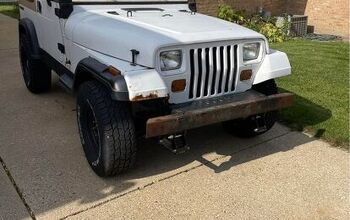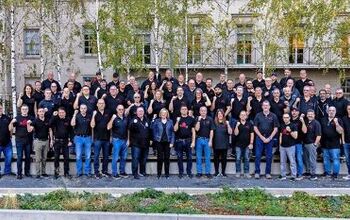Sedans and Missiles: Hyundai Slams Into Another Sales Roadblock

The frustration never seems to end for Hyundai executives. After last year’s Korean labor strife and political scandal, the brand now faces flagging fortunes in the all-important North American market, all thanks to a car-heavy lineup that once guaranteed piles of profit.
Now, the automaker faces the same problem in another global growth engine — China. While that market has also discovered its love for crossovers and SUVs, there’s another problem that Hyundai can’t turn around by rushing a new vehicle to production. Hyundai, it seems, can’t do a damn thing about high-altitude defensive missiles.
Already battered by the Chinese crossover craze — which has seen competitors like General Motors clean up — Hyundai has become a victim of geopolitics.
Anti-Korean sentiment is nothing new to China, but the growing distrust and boycotting of South Korean products — a practice tacitly encouraged by the country’s Communist government — has hit a new high. In response to the nuclear ambitions of North Korea, a key Chinese ally, the South is literally on the defensive. Recently, news emerged that South Korea plans to deploy a U.S.-supplied Terminal High Altitude Area Defense (THAAD) missile battery.
With the first pieces of the missile shield now in place, the system should be fully operational by the end of the year. China isn’t pleased.
According to Bloomberg, Hyundai showrooms in the largest Chinese cities are ghost towns. A manager in a Shanghai dealership told the news agency that weekends will go by without a single person entering the showroom, and that half of his sales staff have already quit.
Reuters reports Hyundai and Kia sales fell a staggering 52 percent in March, year-over-year, as the boycott ramped up. Market share has shrunk to just 3.5 percent. As the automaker counts on China for about a quarter of its overseas sales, the THAAD battery keeping its Seoul headquarters safe from nuclear annihilation won’t save it from that incoming blow. Still, the company persists.
Hyundai plans to offer seven new China-only vehicles, including a gas-powered and electric SUV, to lure Chinese buyers into showrooms. Doing its part, Kia also has a China-only SUV the way.
Beijing Hyundai Motor Company executive Chang Won-shin holds out hopes that anti-Korean sentiment will blow over, telling Bloomberg he expects the business climate to “get better soon.” The company is expected to drop its first-quarter financial report later today, with Kia’s results coming tomorrow.

More by Steph Willems
Latest Car Reviews
Read moreLatest Product Reviews
Read moreRecent Comments
- Kwik_Shift_Pro4X The dominoes start to fall...
- IBx1 Get the standard established, then stop building the chargers while you let others license the design from you to build more stations with your standard disgusting
- IBx1 “Dare to live more”-company that went from making the Countach and Diablo to an Audi crossover with an Audi engine and only pathetic automatic garabge ”live mas”-taco bell
- Pianoboy57 Not buying one of these new when I was a young guy was a big regret. I hated the job I had then so didn't want to commit to payments. I did own a '74 Corona SR later for a short time.
- FreedMike This wasn’t unpredictable. Despite what the eV HaTerZ kLuBB would like you to believe, EV sales are still going up, just not as quickly as they had been, but Tesla’s market share is down dramatically. That’s the result of what I’ve been saying for a long time: that the competition would eventually start catching up, and that’s exactly what’s happening. How did this happen? It boils down to this: we’re not back in 2019 anymore. Back then, if you wanted an EV that wasn’t a dorky looking ecomobile like a Leaf or Bolt, it was pretty much Tesla or bust, and buyers had to deal with all the endemic Tesla issues (build quality problems, bizarre ergonomics, weird styling, and so forth). That’s not the case today – there is a ton of competition, and while these newer models aren’t quite there when it comes to EV tech, they’re getting closer, and most of the Tesla weirdness just doesn’t apply. And then there’s this: stale product is the kiss of death in the car biz, and aside from the vanity project known as Cybertruck, all of Tesla’s stuff is old now. It’s not as “bleeding edge” as it used to be. For a company that made its’ bones on being on the forefront of tech, that’s a big problem.I don’t think Tesla is out of the game – not by a long shot. They’re still the market leader by a very wide margin, and their EV tech is the best in the game. But they need to stop focusing on stuff like the Cybertruck (technically fascinating, but it’s clearly an Elon Musk ego trip), the money/talent suck that is FSD, and the whole robotaxi thing, and put product first. At a minimum, everything they sell needs a very heavy refresh, and the entry level EV is a must.


































Comments
Join the conversation
Something I wasn't aware of until recently: Russia also has a border with North Korea. "Vladimir Putin is sending troops and equipment to Russia's border with North Korea over fears the US is preparing to attack Kim Jong-un. The Russian President fears there will be a huge exodus of North Korean refugees if his American counterpart, Donald Trump, launches military action against Pyongyang." http://www.dailymail.co.uk/news/article-4428384/Putin-sends-troops-Russia-s-border-North-Korea.html
Politics & history . . -Nate